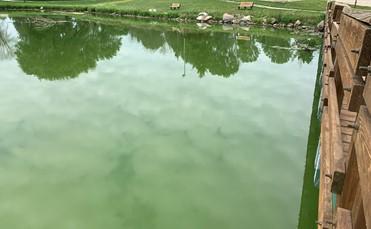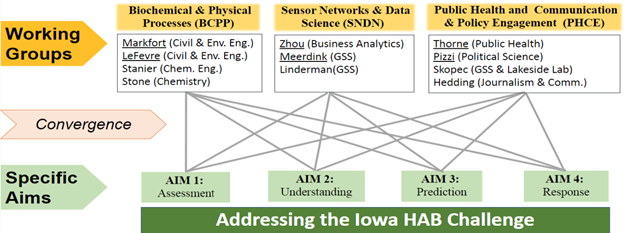This project was funded by the RDO’s Jumpstarting Tomorrow Initiative. The project period was January 2022 – August 2023.
Iowa Healthy Lakes Initiative
A multi-dimensional approach to measuring, informing, and solving Iowa's Harmful Algal Bloom Challenge
HAB Challenge
Iowa’s lakes are critical drinking water sources, with important economic and social value. Nevertheless, lakes across Iowa and the Midwest are experiencing frequent harmful algal blooms (HABs) that imperil the health of people, pets, and ecosystems, and they impede Iowa’s sustainable development goals. Current understanding of HABs is limited by complex, interacting biogeochemical and physical processes that lead to highly dynamic HAB formation in space and time, resulting in challenges for predicting and mitigating risk to lake users. Current approaches fail to promptly report HABs and associated health advisories essential for developing exposure risk tools and stakeholder-driven solutions.
There is a critical need to understand and address Iowa’s HAB challenge through a multifaceted, interdisciplinary approach. A team of scholars from public health and communication, policy, environmental sensing, physical and biochemical, and environmental engineering, have come together to develop solutions and improve the health of Iowa lakes.

A HAB event witnessed at an Iowa lake in 2019. The lake water is green and contains cyanotoxins.
Project Aims
- Assessment
- Understanding
- Predicting
- Response
Working Groups
Interdisciplinary team members were organized into three collaborative working groups:
- Bio-chemical & Physical Processes (BCPP)
- Sensor Networks & Data Science (SNDN)
- Public Health and Communications & Policy Engagement (PHCE)

Working Groups and convergence research aims to address the Iowa HAB Challenge
Example Convergence Research Questions
- What is the risk of Iowa drinking water sources being impacted by CyanoHAB toxins?
- What is the exposure risk of CyanoHAB toxins from inland lakes?
- What is the projected trajectory of HABs in Iowa lakes, and possible mitigation scenarios?
Call for Proposals
The team invited applications for awards ranging from $5,000 to $30,000 to address aspects of Iowa’s HAB challenge, from liberal arts, including fine arts, and science to engineering, employing basic and applied research approaches to characterize, understand, quantify the risks, improving prediction, and advise policy and public engagement.
Applications from artists, scientists, engineers, communicators, and researchers addressing social and environmental justice were especially encouraged.
Proposals included at least two PIs from different departments, from faculty, staff, and postdoctoral investigators, who engage in a team science approach, to establish new collaborations toward building a network of scholars focused on addressing Iowa’s HAB challenge.
Project Teams
Biochemical and Physical Processes Group (BCPP)
Biochemical and Physical Processes Group (BCPP)
Corey Markfort, Project Leader
- Assistant Professor, Civil and Environmental Engineering
- Environmental systems sensing and modeling; Land-Lake-Atmosphere dynamics; Lake Modeling
- Assistant Professor, Civil and Environmental Engineering
- Environmental chemistry; Toxin profiles; Drinking water exposure
- Professor, Chemical and Biochemical Engineering
- Airborne and aerosol health impacts of HABs; Evaluate and improve sampling and prediction strategies for HABs
- Professor, Chemistry
- Aerosol chemistry measurements; Analytical analysis methods
Sensor Network and Data Science Group (SNDS)
- Associate Professor, Business Analytics
- Spatial data analysis and integration; Developing machine learning algorithms for HAB detection and forecasting
- Assistant Professor, Geography and Sustainability Sciences
- Remote sensing data analysis; Temporal and spatial data fusion; Machine learning algorithm development for monitoring HAB dynamics
- Associate Professor, Geography and Sustainability Sciences
- Hyperspectral and drone monitoring of water quality; Monitoring and modeling land use
Public Health, Communications, Public Engagement Group (PHCE)
- Professor, Occupational and Environmental Health
- Environmental health sciences; Community-engaged research; Exposomics; Public health
- Assistant Professor, Political Science
- Natural disaster response; Rural development; Public policy
- Executive Director, Lakeside Laboratory
- Public health advisories; Communication of risk; Engagement with communities; Cyanobacteria microbiology
- Assistant Professor, Journalism and Mass Communication
- Public education; Public opinion; Stakeholder engagement